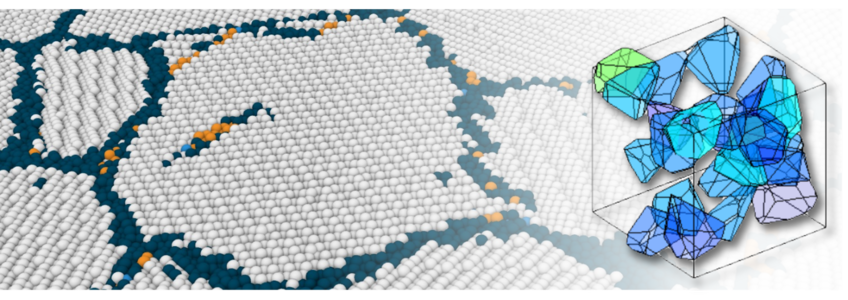
Microstructure and Mechanics
The research group Microstructure and Mechanics uses large-scale atomistic simulations to study the elementary defects of crystalline lattices and how their self-organization and interactions affect the mechanical properties of structural materials.
The mechanical properties of materials are intrinsically determined by their microstructure – the entirety of crystal defects. The research group “Microstructure and Mechanics”, established in September 2021, conducts research into the elementary defects of the crystalline lattice (e.g., dislocations, cracks, interfaces, point defects) and on how the organization and interaction of these defects influence material properties like strength, ductility, hardness, and fracture toughness as well as the material’s behavior under fatigue, creep or tribological loading. To this end the group utilizes large-scale atomistic simulations with up to billions of atoms to obtain detailed information on defect properties and on defect – defect interaction mechanisms.
The group’s activity also includes the modeling of mechanical properties of amorphous systems, including inorganic and metallic glasses, and the study of irradiation damage.
The overarching goal of the Microstructure and Mechanics group is to improve our understanding of the mechanisms underlying materials failure. That way it contributes to the design of new, failure-resistant materials and to the development of robust and reliable models for the prediction of deformation and failure of materials -- ultimately working towards a more sustainable usage of structural materials.
The group’s work benefits from the expertise of the CM department in thermodynamic, electron structure calculations (e.g., through the use of machine learning interatomic potentials) and workflow management, and interacts with the higher-scale modeling efforts in the MA department.
The group closely interacts with experimental groups, e.g. in the SN department, both in the interpretation of their findings and by directly building samples from experimental data. Research data management (RDM) plays a crucial role in such interlinked experimental and computational studies. Therefore, the group is actively involved in the NFDI-Matwerk and other RDM initiatives. It has close ties to the Department of Materials Science and Engineering of the Friedrich-Alexander-Universität Erlangen-Nürnberg, where Prof. Bitzek holds a secondary affiliation.
Current research interests include:
- Multi-Scale Modelling of Fracture
- Nanomechanics and Small-Scale Plasticity
- Mechanical Behavior of Interface-Dominated Materials
- Deformation and Failure of Amorphous Materials
- Plasticity and Fracture of Complex Crystals
as well as the effect of alloying and segregation on these phenomena.